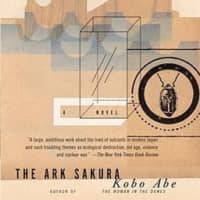In this puzzling, dream-like narrative that requires considerable contemplation, an obese recluse lives in a vast underground bunker situated in a quarry, fearing an imminent apocalypse. At the center of the bunker is a huge all-powerful toilet capable of flushing away anything placed within its reach, where the protagonist was once chained as a child by his rapist father.
The Ark Sakura, by Kobo Abe, Translated by Juliet Winters Carpenter.
333 pages
VINTAGE INTERNATIONAL, Fiction.
He ventures out to a flea market where he purchases a "clockbug," a fictional insect that has no legs and lives off its own feces. Wanting to lure others to his "ark," he passes a "boarding pass" to the insect dealer which is then stolen by a couple of shills (fakes working at the insect stall) — one a man, another a beguiling woman — who break into the bunker.
Abe's novels offer such a dense interlacing of punning wordplay, psychological excavation and surreal imagery that chapters sometimes need to be read twice to prise sense out of them.
Picking up Kafka's idea that a sense of oppression is often a mask for deep-seated psychological desires, confinement in the bunker is less about shielding oneself from exterior apocalypse and more about being trapped, like a "clockbug," in an endless cycle of regurgitating recurrent fears and obsessions.
Abe himself, confined within his own fictional universe, here playfully regurgitates many of the themes of his previous novels, such as the obsessive insect collector of "The Woman in the Dunes" or the sexually tormented wanderer of "Secret Rendezvous."


















With your current subscription plan you can comment on stories. However, before writing your first comment, please create a display name in the Profile section of your subscriber account page.